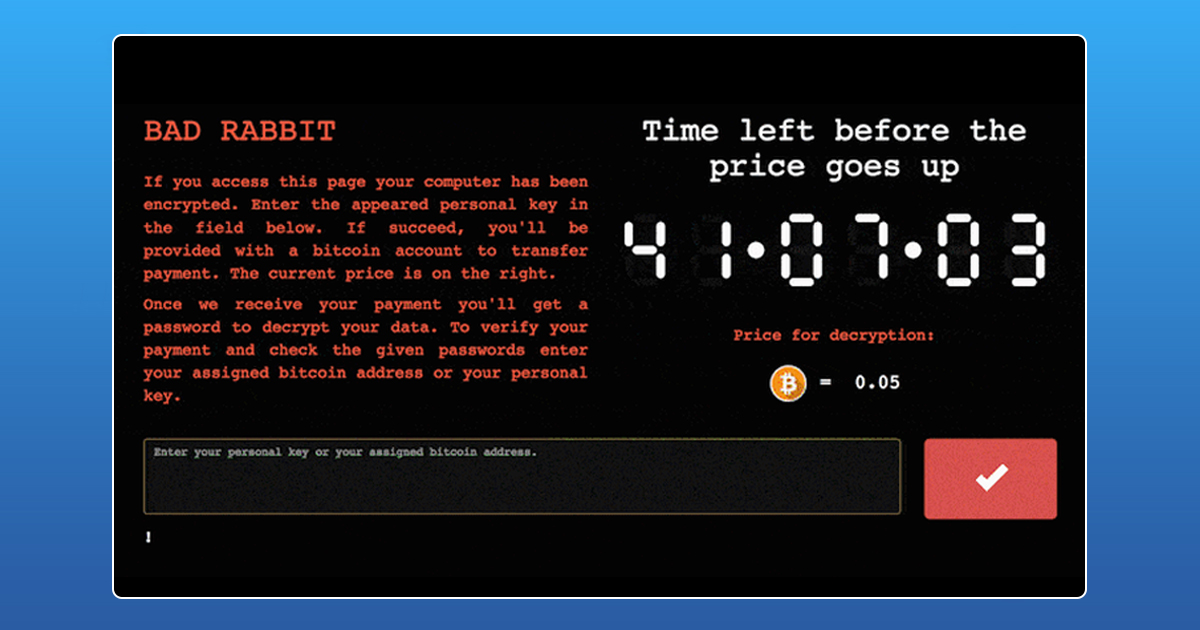Latest News
New Ransomware Spreads Through Russia and Europe

BadRabbit, a new ransomware, the next big cyber attack since ‘NotPetya,’ has been spreading across Russia, Ukraine and other Eastern European countries. Ukraine’s Computer Emergency Response Team (CERT) has confirmed the news regarding the new wave of hacks infecting computer systems in the country.
According to media reports, the ransomware is targeting corporate networks, computer systems for the Kiev Metro, Ukraine’s Odessa International Airport and several Russian media outlets. The malware has also reached Turkey and Bulgaria in addition to Germany and a few other countries. Currently, ESET and Kaspersky’s cybersecurity researchers are keeping a track of the attack.
According to ESET, the malware used for the cyber attack was Diskcoder.D, which is a new variant of ransomware also known as Petya. In June this year, the previous variant of Diskcoder, NotPetya, was used in a damaging cyber attack on a global scale. According to Wired, Kaspersky has counted close to 200 BadRabbit victims out of which 50 or 60 are Ukrainian government computers. However, ESET estimated only 12. 2% of victims were from Ukraine while 65% of the victims were in Russia.
Speaking about the latest cyber attack, Roman Boyarchuk, the Head of the Center for Cyber Protection in Ukraine said, “A lot of systems have been manually disconnected because of the attack, in part to control the spread of the ransomware.” While the outbreak has affected only a small fraction of the size of the NotPetya epidemic, Kaspersky found strong evidence tying the new attack to the creators of the NotPetya ransomware. The cybersecurity firm noted 30 sites which were used to spread Petya also began the distribution of the BadRabbit malware on Tuesday.
The Director of Kaspersky’s Global Research and Analysis team, Costin Raiu, said, “This indicates that the actors behind ExPetr/NotPetya have been carefully planning the BadRabbit attack since July.” The new ransomware, according to Kaspersky, spreads by using the Windows Management Instrumentation Command Line in combination with user credentials the malware steals using the open source tool Mimikatz. Similar to NotPetya, BadRabbit also uses Microsoft’s Server Message Block protocol to spread between computers, using the credentials hardcoded into its software.
Despite the various similarities, it’s still unclear who is behind the recent attack. All computers affected with the malware were directed to a .onion Tor domain and asked to pay 0.05 Bitcoins or roughly $ 276 in exchange for their data. However, all infected users are discouraged from paying the ransom as it is not yet clear if BadRabbit actually decrypts the data after collecting the ransom.
Latest News
Kuku FM’s $200 Million IPO: Mebigo Labs Hires Top Bankers to Lead Public Listing

Kuku FM’s parent company, Mebigo Labs, has hired leading investment banks to prepare for a 200 million dollar IPO in India, marking a major milestone for the country’s digital audio ecosystem. The Mumbai-based company has reportedly appointed Kotak Mahindra Capital, Axis Bank and Morgan Stanley’s India unit to manage the proposed share sale, which is likely to be launched on Indian stock exchanges once key regulatory steps are completed. This move signals strong intent to tap public markets and test investor appetite for subscription-led regional audio platforms in India.
The planned IPO proceeds are expected to help Kuku FM expand its content library, strengthen its regional language offerings and invest in technology to enhance user experience. With a focus on Hindi, Marathi, Tamil and other Indian languages, Kuku FM aims to capture the fast-growing audience in Tier 2 and Tier 3 cities seeking affordable audiobooks, courses and storytelling content. The funds could also provide additional firepower for marketing, partnerships and product innovation, helping the platform compete more aggressively in India’s crowded digital entertainment and creator economy landscape.
Founded in 2018, Kuku FM has built a subscription-driven business model and has reportedly scaled to millions of paying users, backed by multiple funding rounds from prominent investors. Its decision to pursue a 200 million dollar IPO positions it as one of the first major Indian audio platforms to attempt a public listing, potentially paving the way for other podcast and niche content startups to follow. As the IPO process moves forward, Kuku FM’s performance in the public markets will be closely watched as a key indicator of how investors value regional, knowledge-first audio platforms in India’s booming digital economy.
Latest News
Zerodha Reports 23% Profit Decline in FY25 as Revenues Miss Target

Zerodha experienced a challenging FY25, as its revenue fell 11.5% to ₹8,847 crore and net profit dropped 22.9% to ₹4,237 crore. This decline reflects tougher regulatory conditions, lower trading volumes, and increased operational costs in the brokerage market, all of which impacted core earning segments for the company.
Despite these headwinds, Zerodha improved its operating margin to 63.78% and built up significant cash reserves, reporting ₹22,679 crore in bank balances. Salary expenses and director remuneration increased, but disciplined cost controls helped the company maintain profitability and a debt-free balance sheet. The drop in active clients and increased compliance costs further contributed to the profit contraction.
Looking ahead, Zerodha’s resilience is supported by its robust cash position and operational efficiency. Maintaining steady margins, diversifying product offerings, and investing in technology positions the company to withstand future regulatory fluctuations and changing market sentiment reinforcing its status as one of India’s leading brokerage firms.
Latest News
Zoho Pay Debuts as India’s New UPI Challenger, Taking on PhonePe, Paytm, and Google Pay

Zoho Corporation has expanded its fintech portfolio with the launch of Zoho Pay, a UPI-based payments app built to challenge India’s top digital payment giants such as PhonePe, Paytm, and Google Pay. The new app supports peer-to-peer transfers, bill payments, QR-based transactions, and merchant settlements in a streamlined interface. Available as both a standalone app and an integrated feature inside Zoho’s privacy-driven messenger Arattai, Zoho Pay enables users to handle chats and payments in one platform, emphasizing data privacy and Made-in-India innovation.
Through seamless integration with Arattai, Zoho Pay allows users to send or request payments, split expenses, and conduct UPI-based transactions directly in their chat windows. Users can link bank accounts, scan dynamic QR codes, and receive audio confirmations of payments, ensuring speed and security. This design mirrors the simplicity of India’s leading UPI apps but is powered by Zoho’s non-advertising, privacy-first model. The integration aligns with Zoho’s mission to build a self-reliant digital ecosystem, where messaging and money management coexist securely.
In the competitive digital payments market, Zoho Pay differentiates itself through its tight business software integration with apps like Zoho Books, Zoho Payroll, and Zoho Commerce, offering small businesses unified access to payments, billing, and accounting. The company is also expanding its reach with POS devices for merchants featuring UPI QR, card payments, and instant reconciliation tools. With founder Sridhar Vembu’s vision of a ‘Chat + Pay’ ecosystem, Zoho Pay reflects a bold step toward redefining India’s fintech scene with a secure, ad-free, and locally developed alternative to global payment platforms.












Uduidbgf
May 26, 2025 at 5:39 pm
Explore the ranked best online casinos of 2025. Compare bonuses, game selections, and trustworthiness of top platforms for secure and rewarding gameplaycasino activities.
MM88
November 5, 2025 at 7:19 pm
Khám phá thế giới giải trí trực tuyến đỉnh cao tại MM88, nơi mang đến những trải nghiệm cá cược thể thao và casino sống động.
J88
November 7, 2025 at 7:04 am
Đến với J88, bạn sẽ được trải nghiệm dịch vụ cá cược chuyên nghiệp cùng hàng ngàn sự kiện khuyến mãi độc quyền.
iwin
November 10, 2025 at 7:02 am
iwin – nền tảng game bài đổi thưởng uy tín, nơi bạn có thể thử vận may và tận hưởng nhiều tựa game hấp
站群程序
November 11, 2025 at 6:07 am
采用高效谷歌站群策略,快速提升网站在搜索引擎中的可见性与权重。谷歌站群
谷歌站群
November 12, 2025 at 11:35 am
专业构建与管理谷歌站群网络,助力品牌实现全域流量的强势增长。谷歌站群
Kuwin
November 12, 2025 at 4:57 pm
kuwin sở hữu kho game đa dạng từ slot đến trò chơi bài đổi thưởng, mang đến cho bạn những giây phút giải trí tuyệt vời.
GO88
November 22, 2025 at 7:48 pm
Tham gia cộng đồng game thủ tại Go88 để trải nghiệm các trò chơi bài, poker phổ biến nhất hiện nay.